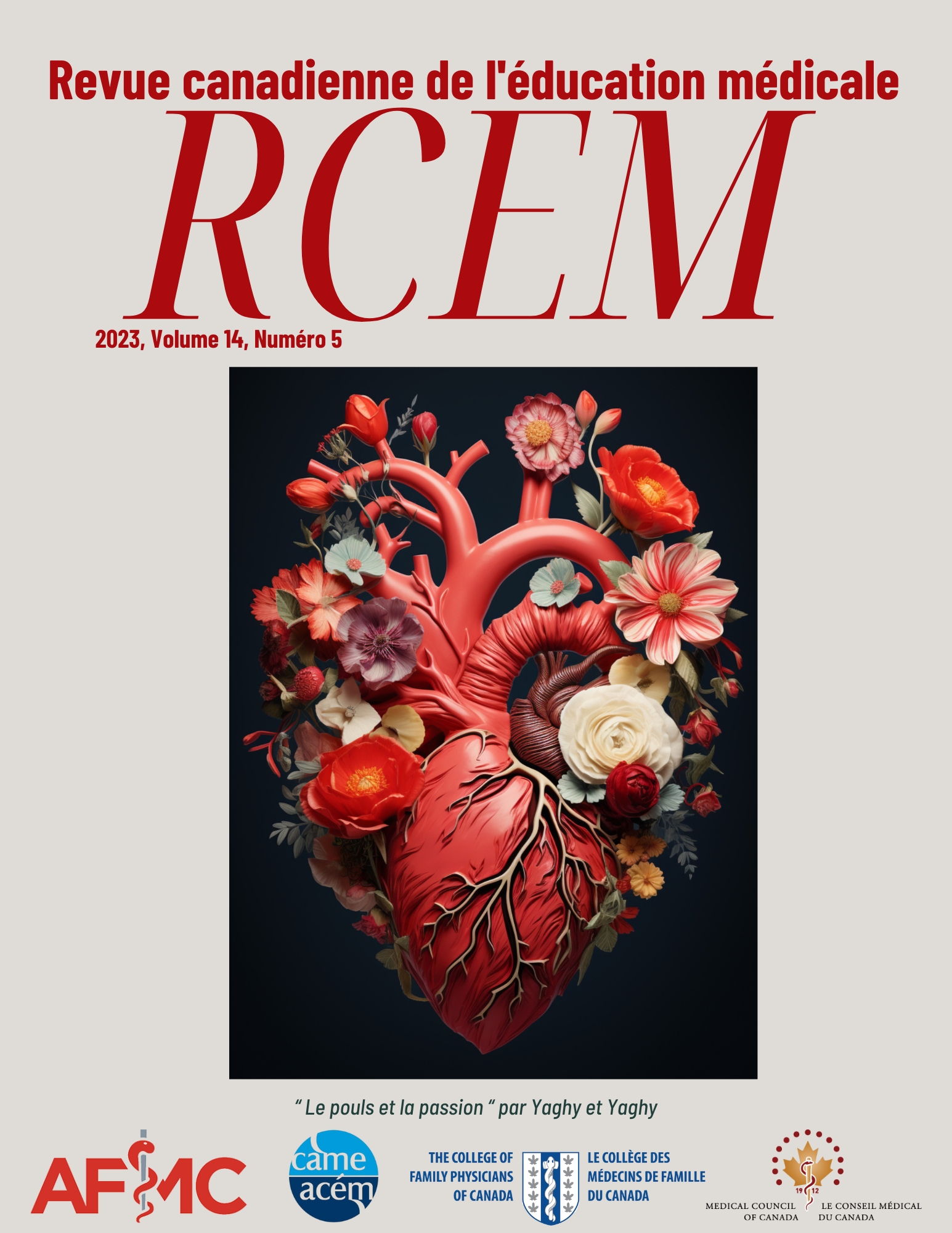Communication brève sur les perceptions et les comportements postulants potentiels aux études de médecine par rapport à la recherche en lien avec l’admission dans une faculté de médecine canadienne
DOI :
https://doi.org/10.36834/cmej.76255Résumé
Contexte : Le comportement des candidats aux études de médecine est déterminé par leur perception de ce qui est valorisé dans le processus de sélection. Tandis que la plupart des établissements canadiens ne mentionnent pas explicitement l’expérience en recherche comme prérequis d’admission, les futurs candidats, eux, voient une telle expérience comme un atout précieux. L’objectif de cette étude est de décrire les perceptions et les comportements des futurs étudiants en médecine par rapport à l’acquisition d’une expérience en recherche en appui à leur demande d’admission dans une école de médecine.
Méthodes : Nous avons interrogé des postulants potentiels aux programmes de médecine au Canada entre août 2021 et novembre 2021, et nous avons compilé des statistiques descriptives relatives à leurs perceptions et à leurs comportements.
Résultats : Les répondants ont affirmé croire que l’expérience en recherche est valorisée dans les processus d’admission aux facultés de médecine. Ils ont déclaré consacrer environ 13 heures par semaine à la recherche, qui, le plus souvent, n’a pas mené à des publications ou des présentations.
Conclusion : Les futurs candidats aux études de médecine investissent beaucoup de temps et d’énergie dans des activités de recherche afin d’améliorer leur dossier de candidature. Les facultés de médecine devraient se prononcer de manière transparente sur l’importance attribuée à l’expérience en recherche dans le cadre de leur processus d’admission.
Références
AFMC. Admission requirements of Canadian Faculties of Medicine for admission in 2023. Ottawa, ON.
Yang L, Chang I, Ritz S, et al. Research experiences for Canadian aspiring physicians: a descriptive analysis of medical school admission policies concerning research involvement in Canada. BMC Med Educ 2022; 22: https://doi.org/1–10.10.1186/s12909-022-03207-y. DOI: https://doi.org/10.1186/s12909-022-03207-y
MedApplications. 5 tips to find a research position as a pre-med college student. 2020. Available at https://medapplications.com/5-tips-find-research-position-pre-med-college-student/ [Accessed on Apr 25, 2021].
Kowarski I. What type of research impresses med schools? US News & World Report. 2019. www.usnews.com/education/best-graduate-schools/top-medical-schools/articles/2019-05-30/what-type-of-research-helps-you-get-into-medical-school [Accessed on Apr 25, 2021].
Princeton Review. 6 ways for pre-meds to gain research experience. 2021. Available at https://www.princetonreview.com/med-school-advice/research-experience-for-medical-school [Accessed on Apr 25, 2021].
Lin KY, Anspach RR, Crawford B, et al. What must I do to succeed?: Narratives from the US premedical experience. Soc Sci Med. 2014; 119: 98–105. https://doi.org/10.1016/j.socscimed.2014.08.017. DOI: https://doi.org/10.1016/j.socscimed.2014.08.017
White J, Brownell K, Lemay J-F, et al. ‘What do they want me to say?’ the hidden curriculum at work in the medical school selection process: a qualitative study. BMC Med Educ 2012; 12: 1–9.10.1186/1472-6920-12-17. https://doi.org/10.1186/1472-6920-12-17 DOI: https://doi.org/10.1186/1472-6920-12-17
Razack S, Lessard D, Hodges BD, Maguire MH, Steinert Y. The more it changes; the more it remains the same: a Foucauldian analysis of Canadian policy documents relevant to student selection for medical school. Adv Health Sci Educ. 2014;19:161–81. https://doi.org/10.1007/s10459-013-9468-2 DOI: https://doi.org/10.1007/s10459-013-9468-2
Hafferty FW. Beyond curriculum reform: confronting medicine’s hidden curriculum. Acad Med. 1998;73:403–7. https://doi.org/10.1097/00001888-199804000-00013 DOI: https://doi.org/10.1097/00001888-199804000-00013
Tummers L. Public policy and behavior change. Public Admin Rev 2019; 79: 925–930. https://doi.org/10.1111/puar.13109. DOI: https://doi.org/10.1111/puar.13109
Artino AR, La Rochelle JS, Dezee KJ, Gehlbach H. Developing questionnaires for educational research: AMEE Guide No. 87. Med Teach. 2014;36(6), 463–474. http://doi.org/10.3109/0142159X.2014.889814. DOI: https://doi.org/10.3109/0142159X.2014.889814
Government of Canada SC. Classification of gender. 2021. https://www23.statcan.gc.ca/imdb/p3VD.pl?Function=getVD&TVD=1326727 [Accessed on Apr 19, 2022].
AFMC. Canadian Medical Education Statistics 2020. Ottawa, ON.
Beran T. Research Advances in Conformity to Peer Pressure: A Negative Side Effect of Medical Education. Health Profess Educ. 2015; 1: 19–23. https://doi.org/10.1016/j.hpe.2015.11.004. DOI: https://doi.org/10.1016/j.hpe.2015.11.004
De Freitas C, Buckley R, Klimo R, et al. Admissions experiences of aspiring physicians from low-income backgrounds. Med Ed. 2021; 55: 840–849. https://doi.org/10.1111/medu.14462. DOI: https://doi.org/10.1111/medu.14462
Michalec B, Hafferty FW. Examining the U.S. premed path as an example of discriminatory design & exploring the role(s) of capital. Soc Theory Health 2022; 1–28. https://doi.org/10.1057/s41285-022-00175-7. DOI: https://doi.org/10.1057/s41285-022-00175-7
Grace MK. Subjective social status and premedical students’ attitudes towards medical school. Soc Sci Med 2017; 184: 84–98. https://doi.org/10.1016/j.socscimed.2017.05.004. DOI: https://doi.org/10.1016/j.socscimed.2017.05.004
Téléchargements
Publié
Numéro
Rubrique
Licence
© Irene Chang, Laurie Yang, Asiana Elma, Stacey A Ritz, Lawrence Grierson 2023

Cette œuvre est sous licence Creative Commons Attribution - Pas d'Utilisation Commerciale - Pas de Modification 4.0 International.
La soumission d’un manuscrit original à la revue constitue une indication qu’il s’agit d’un travail original, qu’il n’a jamais été publié et qu’il n’est pas envisagé pour publication dans une autre revue. S’il est accepté, il sera publié en ligne et ne pourra l’être ailleurs sous la même forme, à des fins commerciales, dans quelque langue que ce soit, sans l’accord de l’éditeur.
La publication d’une recherche scientifique a pour but la diffusion de connaissances et, sous un régime sans but lucratif, ne profite financièrement ni à l’éditeur ni à l’auteur.
Les auteurs qui publient dans la Revue canadienne d’éducation médicale acceptent de publier leurs articles sous la licence Creative Commons Paternité - Pas d’utilisation commerciale, Pas de modification 4.0 Canada. Cette licence permet à quiconque de télécharger et de partager l’article à des fins non commerciales, à condition d’en attribuer le crédit aux auteurs. Pour plus de détails sur les droits que les auteurs accordent aux utilisateurs de leur travail, veuillez consulter le résumé de la licence et la licence complète.











